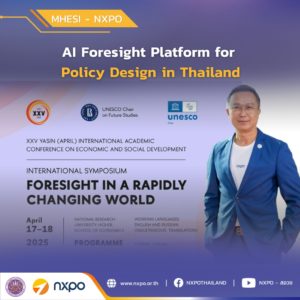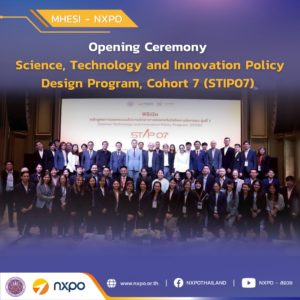
On 13 April 2023, Dr. Surachai Sathitkunarat, Vice President of NXPO and the Executive Director of APEC Center for Technology Foresight (APEC CTF) has joined as an invited speaker in the International Academic Symposium “Foresight and Science, Technology and Innovation Policy” (Moscow, Russia) in the framework of XXIV Yasin (April) International Academic Conference on Economic and Social Development which was organized by the Institute for Statistical Studies and Economics of Knowledge (ISSEK) of the National Research University Higher School of Economics (HSE University) within the framework of coordinated by the Human Capital Multidisciplinary Research Centre, and UNESCO Chair on Future Studies. The symposium focuses on the topics of Futures Studies, S&T Foresight and STI policymaking as well as the new methodologies and methods of Foresight studies and instruments of R&D management, to exchange the best practices of their application worldwide.

In the session 1: Foresight and S&T Priorities Setting, Dr. Sathitkunarat has introduced the Development of Carbon Capture, Utilization and Storage Technology (CCUS) Roadmap in Thailand. Since the announcement of Thailand to reach carbon neutrality by 2050 and net zero GHG emissions by 2065 at the United Nations Framework Convention on Climate Change (UNFCCC) COP 26 in Glasgow, United Kingdom, the previous target of reducing 20–25% GHG emission in the Nationally Determined Contribution (NCD) Roadmap on Mitigation 2021–2030 has been increased to 30–40% to achieve carbon neutrality in 2050. Thus, Thailand decarbonization strategies were considered through four major groups of technologies i.e., CCUS, Fuel Switching, Electrification, and Hydrogen.

The CCUS technology has a high potential for the capture of CO2 from large point sources such as power generation or industrial facilities. To develop a technology roadmap for CCUS, the stakeholder workshops were held in Bangkok in June 2022 and key enablers from debate and discussion at both policy and academic levels were collected as well as driving mechanisms such as global or inter-organizational partnerships, technology transfer, fundings.

In addition, Dr. Sathitkunarat also introduced two new APEC–CTF projects in 2023 which are (1) APEC Strategic Foresight and (2) Driving Sustainable Growth by Circular Business Development through Design. These projects are working through the collaboration in APEC economies and have already been submitted for APEC funding projects. Strategic foresight tools will be used in the first project to identify future challenges, uncertainties, key agendas and key enabling technologies for APEC.







